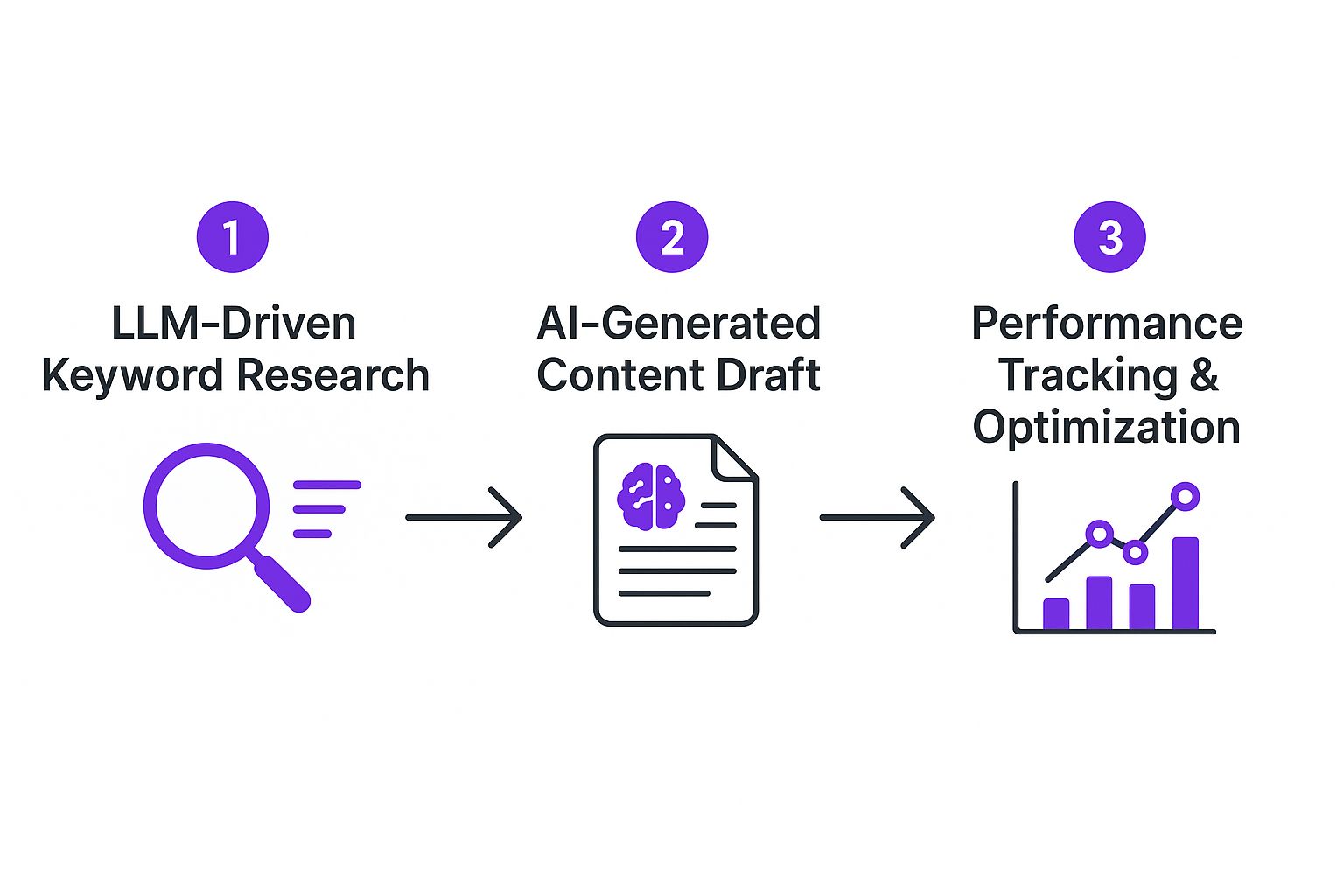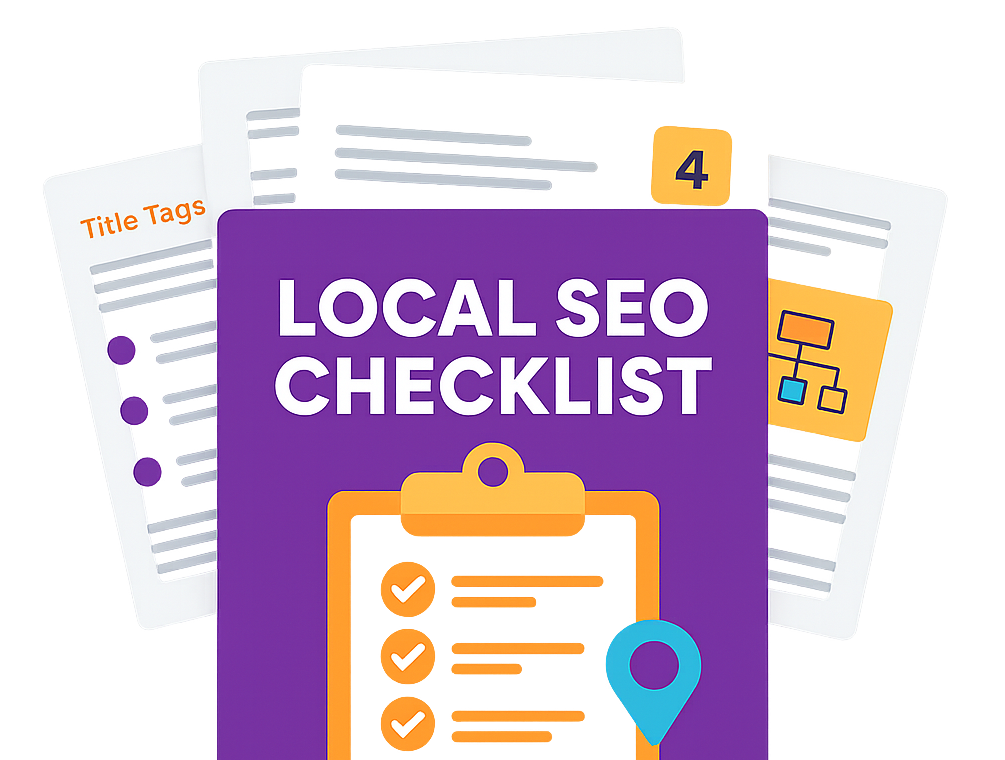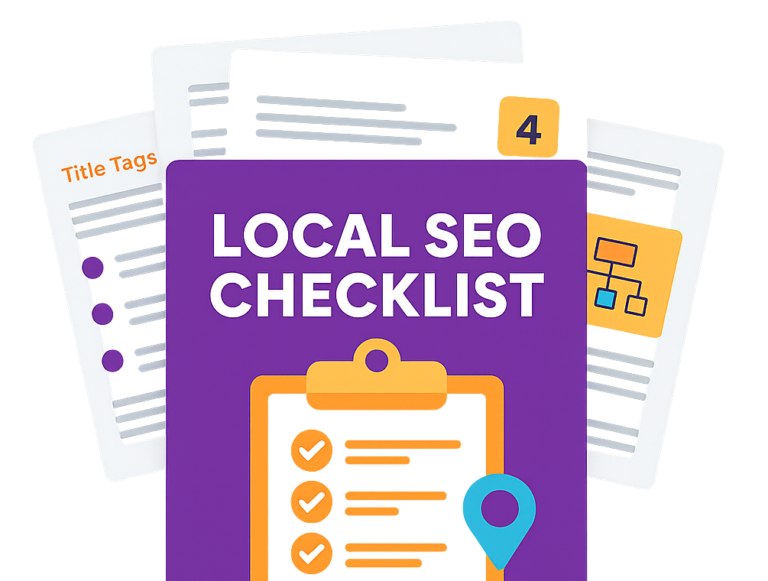LLM SEO, or Large Language Model Search Engine Optimisation, is all about positioning your content as the go-to, trusted source for AI chatbots like ChatGPT and Google's AI Overviews. It’s a strategic shift away from just trying to rank on a page of results to becoming the direct answer an AI gives its users.
Understanding LLM SEO and Why It Matters Now
Think of it this way: traditional SEO is like having the best-stocked shop on the high street, perfectly organised to draw in people who are just browsing. LLM SEO, on the other hand, is like being the renowned local expert everyone recommends by name whenever someone asks for advice. You’re not just another option in a long list; you become the definitive answer.
This shift is crucial for UK businesses because people are increasingly turning to AI for quick, conversational answers, completely bypassing the classic list of blue links. Understanding the mechanics, like how Google's AI Overview ranks content, isn't just preparing for the future—it’s a competitive advantage you can seize right now.
The New Search Landscape
Large Language Model Optimisation (LLMO) is a new field focused on one thing: getting your brand and content cited by AI models. Here in the UK, the digital marketing scene is having to adapt quickly. With some reports suggesting a drop in traditional web search clicks of around 34%, it's clear that users are starting to rely on AI-generated summaries for their answers.
This means UK businesses need to evolve their SEO game. It's no longer enough to have solid keyword strategies and a healthy backlink profile. Now, your content also needs to be:
- Factually Verifiable: AI models are built to prioritise accuracy and will cross-reference information from multiple sources. Make sure your facts are solid.
- Authoritative: Your content must show genuine, deep expertise on a subject. You need to prove you know your stuff.
- Conversationally Optimised: It has to directly answer the kinds of natural language questions real people are asking their devices.
The core idea behind LLM SEO is simple: become so trustworthy and clear that an AI has no other choice but to use your content as its source of truth. It’s about building authority at a machine-readable level.
To give you a clearer picture, let's compare the old and new ways of thinking about SEO.
Traditional SEO vs LLM SEO at a Glance
The table below breaks down the key differences between the traditional SEO approach we've used for years and the new mindset required for LLM SEO.
| Aspect | Traditional SEO Focus | LLM SEO Focus |
|---|---|---|
| Primary Goal | Rank high on a Search Engine Results Page (SERP). | Become a cited source in AI-generated answers. |
| Content Strategy | Target specific keywords and search queries. | Cover topics comprehensively and answer questions directly. |
| Key Metric | Organic traffic, keyword rankings, click-through rate. | Brand mentions, citations in AI Overviews, visibility. |
| User Interaction | User clicks a link to visit your website. | User gets an immediate answer, often without a click. |
| Core Element | Keywords and backlinks. | Expertise, authoritativeness, and trust (E-E-A-T). |
As you can see, while the fundamentals of creating good content remain, the objective has shifted significantly from visibility in a list to authority in an answer.
From Keywords to Concepts
Keywords still have a place, but the emphasis is moving towards covering entire topics from top to bottom. LLMs are designed to understand context, the relationships between different ideas, and what a user truly wants to know. This is where a holistic strategy that understands the role of AI for SEO becomes non-negotiable.
Your ultimate goal is to build a knowledge base so strong that when an AI scans the web for information in your niche, your website stands out as the most reliable, complete, and trustworthy resource available. This is how you set yourself up for lasting success in an AI-powered search world.
The Three Pillars of a Winning LLM SEO Strategy

Getting LLM SEO right isn’t about finding a magic bullet or endlessly chasing algorithm updates. It’s a much more grounded process. The goal is to methodically build a foundation of undeniable trust and clarity, making your content the most logical and reliable choice for an AI to use as a source.
A winning strategy is built on three core pillars. When they work together, they send clear signals to AI models that your website is a definitive source of information—one worth presenting as a direct answer. Let's break down what they are and why each one is so vital.
Pillar 1: E-E-A-T Is Your Digital Reputation
The first and most important pillar is E-E-A-T, which stands for Experience, Expertise, Authoritativeness, and Trustworthiness. This isn’t just another Google guideline; it’s the bedrock of how LLMs figure out if information is any good. Get this wrong, and the other two pillars simply won’t hold up.
- Experience: Show you’ve actually done the things you’re talking about. If you’re reviewing a product, include photos of you using it. If you’re explaining a process, prove you’ve been through it yourself.
- Expertise: Go deep. This comes from creating content that is comprehensive, accurate, and incredibly well-researched.
- Authoritativeness: You want to be the recognised go-to source in your field. This is earned through backlinks from other credible sites and mentions by industry experts.
- Trustworthiness: Be transparent and honest. Have clear author bios, cite your sources, and make sure your website is secure (HTTPS).
For an AI, these signals are like checking your credentials. They prove you're not just repeating what others have said, but are a credible voice whose content can be trusted.
Pillar 2: Structured Data Is The AI’s Instruction Manual
The second pillar is structured data, usually put in place with Schema markup. Think of your website as a library full of books. Structured data is the digital equivalent of a perfectly organised card catalogue. It tells AI models exactly what each piece of content is about, who wrote it, and how different bits of information connect.
Structured data translates your human-readable content into a machine-readable format. It removes ambiguity, helping an LLM understand the context and specifics of your information with near-perfect accuracy. This is a non-negotiable part of modern technical SEO.
For example, Schema can explicitly identify your company's name, address, and phone number for a local search. It can also detail an article's author and publication date to reinforce your E-E-A-T signals. By speaking the language of search engines, you make it incredibly easy for them to validate and use your information. This is one of the key developments discussed in recent 2023 SEO trends that continues to grow in importance.
Pillar 3: Comprehensive Content Answers The Question Fully
The final pillar is creating comprehensive, conversational content that gives clear, verifiable answers. LLMs are designed to end a user's search journey, not just offer them more links to click. Your content needs to be the final destination.
This means thinking ahead and answering every related question a user might have within a single, authoritative piece.
Instead of writing a short blog post on one specific keyword, aim to create a detailed guide that covers the entire topic from top to bottom. Use clear headings, bullet points, and simple language to get straight to the point and satisfy what the user is looking for. Understanding how AI-driven keyword optimisation works for other media can offer great insights into how to build these all-in-one answers.
By focusing on these three pillars—proving your authority with E-E-A-T, clarifying your content with structured data, and satisfying users with complete answers—you build an LLM SEO strategy that is both effective and built to last.
How LLMs Are Reshaping Local UK Search

For small and medium-sized businesses across the UK, the local search game is changing in a big way. The rise of LLM SEO means that AI-powered assistants are becoming the new ‘word-of-mouth’ referral, directly answering conversational questions from potential customers right in your area.
It’s no longer about someone simply typing "plumbers Manchester" into Google. Now, they're asking their phones, "Who is the best emergency plumber near me in Manchester available on a Sunday?" or "Where can I find a top-rated Sunday roast in Bristol with a dog-friendly garden?"
To win in this new environment, your business needs to be the definitive, trusted local expert that an AI feels confident recommending. This takes more than just traditional local SEO; it demands a focused strategy that sends clear, unmistakable signals of your local authority.
Optimise for Conversational Local Queries
The first step is a mental shift—move from thinking about keywords to thinking about questions. Your potential customers are literally having a conversation with their devices, and your online presence needs to be part of that dialogue.
So, put yourself in their shoes. What specific problems do they have? What language would they actually use? For instance, a bakery in Cambridge should be ready to answer questions like:
- "Where can I buy handmade sourdough bread in Cambridge?"
- "Which Cambridge bakery offers vegan birthday cakes?"
- "What are the best coffee and cake deals near Cambridge train station?"
By creating dedicated pages or detailed FAQ sections that directly tackle these long-tail local questions, you’re essentially spoon-feeding AI the exact answers it needs. This immediately positions your business as the most helpful and relevant local resource.
The heart of local LLM SEO is all about anticipating and directly answering the nuanced, real-world questions your community is asking. Your goal is to be the most helpful local expert in a way an AI can easily understand and repeat.
Achieve Absolute NAP Consistency
Your Name, Address, and Phone number (NAP) is your business's digital fingerprint. For an AI to trust you, these details must be perfectly consistent everywhere they appear online. This isn't just a suggestion; it's non-negotiable.
Even tiny inconsistencies, like using "Ltd" on one site and "Limited" on another, can create enough doubt for an AI to favour a competitor with cleaner data. Making sure your NAP is identical across your website, Google Business Profile, and major UK directories is a foundational task.
In fact, recent analysis shows that UK SMEs with consistent NAP details across directories like Yell, Thomson Local, and Scoot can see their local rankings improve by as much as 25%. To get started, you might want to explore some of the best local SEO tools in 2023 that can help you manage these citations much more efficiently.
Right, let's talk about putting all this theory into practice. Moving from a good idea to a solid plan is where many businesses get stuck, but the good news is that LLM SEO doesn't mean tearing down your entire marketing strategy and starting from scratch. It’s more about a methodical, phased approach—sharpening up what you already have to meet the new demands of AI.
I've broken the process down into manageable stages. By working through each step, any UK business can start aligning its website with the core principles of authority and trust that AI models are built to reward.
Phase 1: Conduct a Foundational Content Audit
Before you even think about creating anything new, you have to get a handle on what you've already got. A content audit for LLM SEO is more than just a quick scan for broken links or old dates. Its real job is to spot the gaps in your topical authority and hunt down any factual inaccuracies across your site.
Go through your most important pages with a critical eye. For each one, ask yourself:
- Does this page give a complete, definitive answer to a real user's question?
- Are all the facts, figures, and claims spot-on and, wherever you can, linked back to authoritative sources?
- Is the content laid out logically with clear headings that an AI can easily parse to understand what it’s all about?
This audit is your starting point. It will clearly show you which pages are strong assets and which ones need a major rethink or should just be retired.
Phase 2: Perform Conversational Keyword Research
Next up, it’s time to uncover the real questions your audience is asking. Traditional keyword research often gets stuck on short, high-volume terms. Conversational keyword research, on the other hand, is all about capturing the full-sentence, natural language people use when they're talking to a voice assistant or typing a query into an AI chatbot.
The goal is to shift from targeting what people type to answering what they truly mean. This requires digging into forums like Reddit and Quora, analysing 'People Also Ask' sections on Google, and using tools that reveal long-tail question-based queries.
This research hands you a blueprint for creating content that speaks directly to what users actually want to know. That makes your content a prime candidate to be cited in an AI-generated answer.
This simple flow shows how research, creation, and optimisation all feed into each other in a continuous cycle.

The key takeaway here is that LLM SEO isn't a one-and-done job. It's a constant loop of refining what you have and tracking how it performs.
Phase 3: Create and Optimise Definitive Content
Armed with your audit findings and conversational keyword research, it's time to get to work creating or updating your content. The aim is to build definitive resource pages that cover a topic so thoroughly that there's no reason for a user—or an AI—to go looking anywhere else.
This means structuring your content with a clear hierarchy, using solid data to back up your claims, and writing in a clear, unambiguous style. Think of each piece as a standalone knowledge hub for its specific niche.
Phase 4: Handle Technical Implementation
Finally, you need to make sure your site's technical foundations are rock-solid. The single most important element here is the correct use of structured data, also known as Schema markup. This bit of code acts like a translator, explicitly telling search engines what your content is about, who wrote it, and why it's a credible source of information.
Alongside structured data, make sure your site has excellent Core Web Vitals, is mobile-friendly, and has a clean, logical site architecture. These technical signals are the final piece of the puzzle, reinforcing the trustworthiness that LLMs need to see.
To help you keep track of all these moving parts, here’s a simple checklist to guide your implementation.
Your LLM SEO Implementation Checklist
This checklist breaks down the key actions you need to take in each phase. It's designed to be a practical guide to get you started and keep your efforts on track.
| Phase | Key Action | Tool/Resource Example |
|---|---|---|
| Phase 1: Audit | Assess all key content for accuracy, depth, and clarity. Identify authority gaps. | Screaming Frog SEO Spider |
| Phase 2: Research | Find long-tail, conversational questions your audience is asking. | AlsoAsked or AnswerThePublic |
| Phase 3: Content | Create or update pages to be comprehensive, fact-based resources. | Your own internal expertise, Grammarly for clarity |
| Phase 4: Technical | Implement Schema markup and fix core technical SEO issues. | Schema.org documentation, Google's Rich Results Test |
By systematically working through this list, you'll be building a strong foundation that not only serves your human audience but also positions your site as a trusted source for the AI-powered search engines of today and tomorrow.
How to Measure Success in an AI-Driven World

In the new landscape of LLM SEO, relying on old-school metrics like clicks and rankings just won't cut it. Think about it: when an AI serves up a direct answer using your content, the user might never need to click through to your site. So, if a click isn't the end goal anymore, how do you know if you're actually winning?
Success now means thinking about your analytics in a completely different way. Instead of being obsessed with website traffic, the focus is shifting to how visible and authoritative your brand is within these AI-powered conversations. The game has changed from winning the click to being the answer.
This shift demands that your measurement strategy evolves, too. You need to start looking for new signals that show your LLM SEO efforts are hitting the mark and that your content is being seen as a credible source.
New Metrics for a New Reality
To really get a feel for your performance, you have to look beyond standard analytics and zero in on metrics that prove your influence in this new world. It’s all about tracking your presence where the answers are being created.
Here are the key performance indicators (KPIs) you should start keeping a close eye on:
- Brand Mentions in AI Answers: This is the most direct sign you’re on the right track. Use monitoring tools to see how often your brand or content gets cited in responses from models like ChatGPT or Google’s AI Overviews.
- Traffic to Cited Source Pages: While not everyone will click, the curious ones will. A steady stream of referral traffic from AI platforms to the exact pages being cited is a massive vote of confidence.
- A Rise in Branded Search Queries: As more people see your brand named as an authority, they'll start looking for you directly. An uptick in searches for "Your Brand" or "Your Brand + topic" is a clear sign your reputation is growing.
These metrics paint a much more accurate picture of your performance today. For a deeper look at measurement, our guide on the top metrics to measure on-page SEO success offers a solid foundation you can build on.
The ultimate measure of success in LLM SEO is becoming a "zero-click authority." This means your brand is so trusted that its name alone, cited in an AI answer, is enough to build credibility and influence customer decisions, even without a direct website visit.
Evolution, Not Revolution
While these new metrics are important, it's crucial to remember that this is an evolution, not a complete teardown of everything we know. In fact, foundational SEO principles are more critical than ever. A technically sound website, high-quality backlinks, and genuinely expert content are the bedrock on which all LLM authority is built.
SEO in the UK continues to change, but it’s still a vital part of any solid digital marketing strategy. While AI tools can handle many tasks, it’s the human-led strategy—focused on user intent and creating rich, helpful content—that really makes the difference.
In fact, UK marketers have found that organic traffic from AI-enhanced SEO strategies grows by around 12% each year. This growth comes from a focus on holistic content and entity-level optimisation, which also leads to a 20% increase in featured snippet acquisitions.
The key to long-term growth is to blend proven SEO tactics with these new, AI-focused strategies. By building a powerful foundation and adapting how you measure success, you can make sure your business doesn't just survive, but thrives.
Common Questions About LLM SEO
Even with a clear plan, stepping into a new field like LLM SEO is bound to raise a few questions. That’s perfectly normal. Let's clear up some of the most common queries to help you move forward with confidence.
This section gets into the practical concerns that business owners and marketers often bring up, from allocating resources to figuring out how this new approach fits with what you’re already doing.
Do I Still Need Traditional SEO if I Focus on LLM SEO?
Yes, absolutely. Think of LLM SEO not as a replacement, but as the next step in your SEO journey. It builds directly on the foundations you’ve already laid.
Your core SEO fundamentals—like a technically sound website, high-quality backlinks, and genuinely valuable content—are the exact signals that LLMs rely on to gauge trust and authority.
Honestly, without strong traditional SEO, it's nearly impossible for an AI to see your content as a credible source. The real magic happens when you blend proven practices with these new, AI-focused optimisations.
LLM SEO and traditional SEO are two sides of the same coin. A strong technical foundation and high-quality content are prerequisites for convincing both search engine crawlers and AI models of your authority.
What Is the Single Most Important Thing I Can Do Today?
If you can only do one thing right now, make it this: become the undeniable expert on one specific, relevant topic. This is the most powerful signal you can possibly send.
Get to work creating comprehensive, factually accurate, and clearly written content that answers every question a user could have about your niche. Go deeper than your competitors, cite your sources to prove you’ve done your homework, and structure everything logically so it’s easy to follow. This kind of deep, demonstrated expertise is precisely what LLMs are designed to find and reward.
How Can a Small Business Compete in LLM SEO?
This is where small businesses actually have a secret weapon: you can win by completely dominating a narrow niche. Don't even try to rank for a broad term like "digital marketing." Instead, aim to become the ultimate resource for something incredibly specific, like "social media marketing for independent bookshops in Scotland."
This focused strategy lets you build the kind of depth and authority that LLMs love, all without needing the budget of a huge corporation. By owning your topic and answering those local, hyper-specific questions that bigger brands ignore, you can execute a low-cost, high-impact plan that really works.
How Long Does It Take to See Results from LLM SEO?
Just like traditional search engine optimisation, LLM SEO is a long game. You won't see results overnight, so it's important to set the right expectations from the start.
It takes time for search engines and AI models to crawl, index, and re-evaluate your content's newfound authority and trustworthiness. You’ll typically need to put in consistent effort for several months before you start seeing your brand pop up in AI-generated answers.
Patience and a firm commitment to creating top-tier, authoritative content are what separate the winners from the losers in this new arena.
Ready to make your business the trusted answer in an AI-driven world? Bare Digital offers a free, no-obligation SEO Health Check to identify your biggest opportunities. Our specialists create a tailored Activity Plan to boost your rankings and drive real results.








